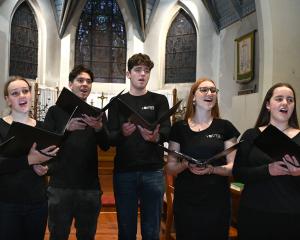
Felix Bello, who will graduate from the university at a ceremony at the Dunedin Town Hall today, is a lecturer at Mzuzu University in Malawi.
His PhD was undertaken through the Otago tourism department and focused on ‘‘protected area'' tourism.
Mr Bello began collecting textbooks and journals this month, expecting to take a few back with him through his excess luggage allowance.
But he was encouraged by tourism's head of department, Associate Prof Neil Carr, to expand his request to other university departments.
Mr Bello had since been ‘‘overwhelmed'' by the response.
Donated books have poured in, filling a couple of dozen boxes.
The tourism department will help with some of the shipping costs, and Mr Bello is trying to raise some extra money to help transport the books.
Mr Bello said Mzuzu University was a public institution and, as is the case with most small universities in Sub-Saharan Africa, it was under-resourced in teaching and learning materials.
"It is not uncommon to have a course with 50 to 100 students, with only one copy of a recommended textbook available in the university library,'' he said.
The donated books and journals would make a "huge difference'' to his university's academic staff and students, he said.
His PhD thesis focused on "Local Communities and Tourism Development in Protected Areas in Malawi: Investigating Community Involvement''.
Wildlife in protected areas was one of the "major tourist attractions'' in most southern African countries.
As government funding for conservation across the world continued to decline, various forms of tourism had been developed in protected areas to "generate revenue for conservation'' and to provide an economic justification for the "continued existence of protected areas''.
Mr Bello wanted to explore tourism approaches that provided for local community participation and genuine community benefits.
His main supervisor, Associate Prof Brent Lovelock, said the research was a major achievement.
Prof Lovelock joked that the textbook appeal had become "the victim of its own success'', raising questions about how the funding could be raised to transport the many books to Malawi.
No more books were needed at this stage, but offers of financial donations to help transport the books were welcome.
Prof Lovelock could be contacted via email at brent.lovelock@otago.ac.nz












